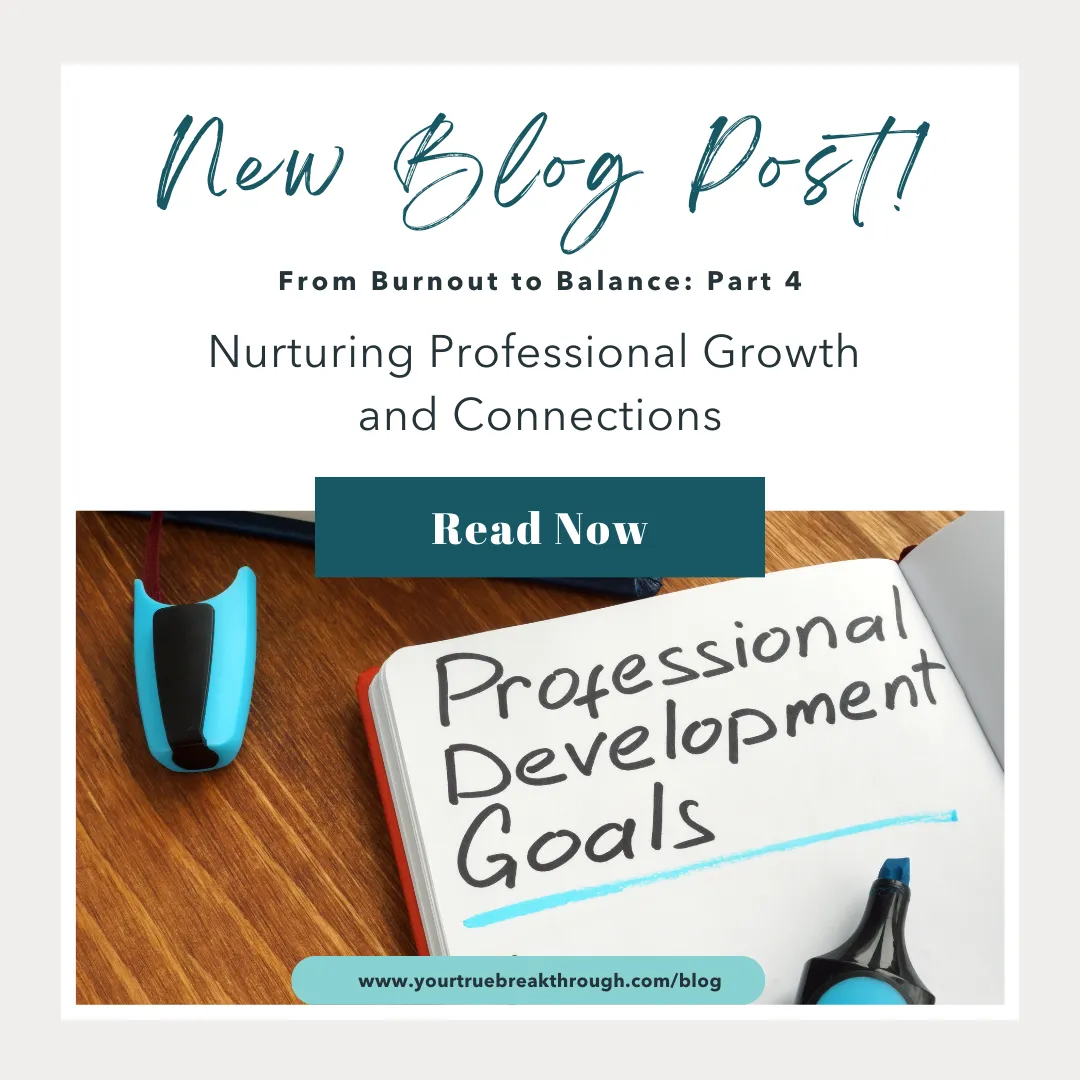Blog

From Burnout to Balance: Part 4 - Nurturing Professional Growth and Connections
Welcome back to our series on transitioning from burnout to balance. We've explored recognizing burnout signs, the importance of emotional processing, self-care, and the power of shifting perspectives and taking action. In this fourth installment, we'll focus on nurturing professional growth and connections, a critical aspect of achieving and maintaining a balanced professional life.
The Importance of Social Connections
Social connections play a vital role in our personal and professional lives. Rich interpersonal interactions can provide support, foster a sense of belonging, and contribute to our overall well-being. In the context of professional growth, these connections can also open doors to new opportunities and learning experiences. Here are some tips to nurture your social connections:
Seek Out Mentors and Coaches: Mentors and coaches can provide guidance, share their experiences, and help you navigate your professional journey. They can challenge your thinking, help you set and achieve goals, and provide support when you face challenges.
Network: Networking is not just about attending events and collecting business cards. It's about building relationships. Attend industry events, join professional organizations, and participate in online forums related to your field. Remember, networking is a two-way street. Look for ways you can help others as well.
Foster Strong Relationships at Work: Building strong relationships with your colleagues can make your work environment more enjoyable and supportive. These relationships can also lead to collaborations, learning opportunities, and career advancement.
Learning and Expanding Skills
Lifelong learning is a key component of personal and professional growth. The pursuit of new knowledge and skills can enhance your capabilities, increase your adaptability, and contribute to your sense of fulfillment. Here are some tips to foster lifelong learning:
Pursue Professional Development Opportunities: Look for opportunities to expand your skills and knowledge. This could be attending workshops, enrolling in courses, or earning certifications. Many organizations offer professional development opportunities, so take advantage of these if you can.
Stay Current with Industry Trends: Keeping up with industry trends can help you stay competitive and innovative. Read industry publications, follow thought leaders on social media, and attend industry conferences or webinars.
Embrace Challenges: Challenges can be excellent learning opportunities. They push you out of your comfort zone and help you develop new skills and resilience. Don't shy away from challenging projects or roles.
Learn from Others: Every person you meet knows something you don't. Be open to learning from others, whether they're a colleague, a mentor, or even a junior staff member.
Remember, nurturing professional growth and connections is an ongoing process, not a one-time event. It's about continually learning, growing, and building relationships. As we continue our series, we'll delve deeper into strategies for maintaining balance and preventing burnout.
If you'd like to learn more about Mindset Coaching or Hypnotherapy and how it can support your journey, book your complimentary 30-min consultation for a personalized recommendation.
Stay tuned for the next part of our series, where we'll explore more strategies for achieving and maintaining a balanced professional life.
Blog

From Burnout to Balance: Part 4 - Nurturing Professional Growth and Connections
Welcome back to our series on transitioning from burnout to balance. We've explored recognizing burnout signs, the importance of emotional processing, self-care, and the power of shifting perspectives and taking action. In this fourth installment, we'll focus on nurturing professional growth and connections, a critical aspect of achieving and maintaining a balanced professional life.
The Importance of Social Connections
Social connections play a vital role in our personal and professional lives. Rich interpersonal interactions can provide support, foster a sense of belonging, and contribute to our overall well-being. In the context of professional growth, these connections can also open doors to new opportunities and learning experiences. Here are some tips to nurture your social connections:
Seek Out Mentors and Coaches: Mentors and coaches can provide guidance, share their experiences, and help you navigate your professional journey. They can challenge your thinking, help you set and achieve goals, and provide support when you face challenges.
Network: Networking is not just about attending events and collecting business cards. It's about building relationships. Attend industry events, join professional organizations, and participate in online forums related to your field. Remember, networking is a two-way street. Look for ways you can help others as well.
Foster Strong Relationships at Work: Building strong relationships with your colleagues can make your work environment more enjoyable and supportive. These relationships can also lead to collaborations, learning opportunities, and career advancement.
Learning and Expanding Skills
Lifelong learning is a key component of personal and professional growth. The pursuit of new knowledge and skills can enhance your capabilities, increase your adaptability, and contribute to your sense of fulfillment. Here are some tips to foster lifelong learning:
Pursue Professional Development Opportunities: Look for opportunities to expand your skills and knowledge. This could be attending workshops, enrolling in courses, or earning certifications. Many organizations offer professional development opportunities, so take advantage of these if you can.
Stay Current with Industry Trends: Keeping up with industry trends can help you stay competitive and innovative. Read industry publications, follow thought leaders on social media, and attend industry conferences or webinars.
Embrace Challenges: Challenges can be excellent learning opportunities. They push you out of your comfort zone and help you develop new skills and resilience. Don't shy away from challenging projects or roles.
Learn from Others: Every person you meet knows something you don't. Be open to learning from others, whether they're a colleague, a mentor, or even a junior staff member.
Remember, nurturing professional growth and connections is an ongoing process, not a one-time event. It's about continually learning, growing, and building relationships. As we continue our series, we'll delve deeper into strategies for maintaining balance and preventing burnout.
If you'd like to learn more about Mindset Coaching or Hypnotherapy and how it can support your journey, book your complimentary 30-min consultation for a personalized recommendation.
Stay tuned for the next part of our series, where we'll explore more strategies for achieving and maintaining a balanced professional life.




